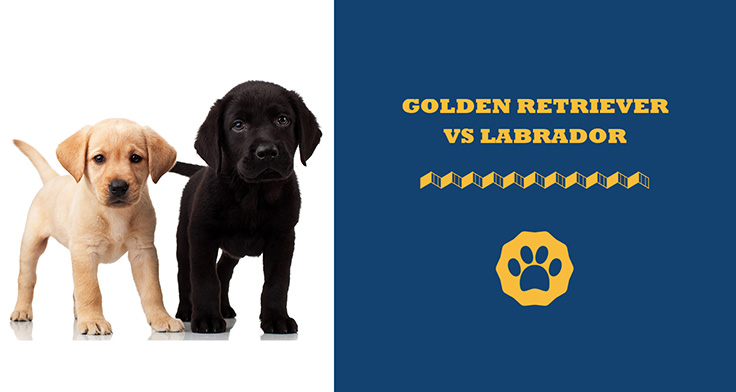Updated: June 29th, 2022
This article contains affiliate links. Read the full disclosure here.

If you are looking for a family dog that has enough energy to join you in your active lifestyle, then you have probably considered both Golden Retrievers and Labrador Retrievers.
When researching them, you have probably also heard them described in very similar terms as energetic, intelligent, and loving dogs that are easy to train and make great family pets. The breeds are so alike, in fact, you’re probably wondering what the actual differences are between them.
In this article, I’m going to take a close look at these two classic breeds, their differences, and how to determine which would make a better addition to your family.
At the end of the day, of course, they are both great dogs. If you have the time and energy to care for them properly, you can’t go wrong with either as a family pet.
Golden Retriever vs. Labrador Retriever – Summary Table
Characteristic | Golden Retriever | Labrador Retriever |
Size | 21.5-22.5 inches females 23-24 inches males | 21.5-23.5 inches females 22.5-24.5 inches males |
Weight | 55-65 lbs females 65-75 lbs males | 55-70 lbs females 65-80 lbs males |
Coat | Flat or wavy double coat with feathering - high shedding | Short, dense, smooth, double coat - high shedding |
Color | Yellow, Gold, or Cream | Yellow, Chocolate, or Black |
Lifespan | 10-12 years | 10-12 years |
Trainability | Intelligent and eager to please | Intelligent and eager to please |
Temperament | Loving and family oriented | Loving and family oriented |
Energy Levels | High | Very High |
Price | $1,000-$1,300 | $1,000-$2,500 |
Appearance
While Yellow Labs and Golden Retrievers might look the same at first glance, there are actually some significant differences in their appearances.
For starters, Labradors are a little bit bigger than Goldens. While a female Golden will measure 21.5 to 22.5 inches, a female Lab can grow to be around 23.5 inches. The situation is similar with males. While both can be as small as 22.5 inches, Goldens usually max out at 24 inches, while Labs can be a bit larger at 24.5 inches.
While this might not seem like much of a difference, you can see the effect in their weight. While a female Golden will weigh 55 to 65 pounds, a female Labrador can weigh up to 70 pounds. While male Goldens will weigh between 65 and 75 pounds, Lab males can weigh up to 80 pounds.
Golden Retrievers can seem a bit bigger than they are because they have quite a feathery coat, while Labradors have a shorter, slicker coat. Additionally, while Goldens will always be “golden” in color, varying from gold to cream, Labrador Retrievers can be yellow, chocolate, or black.
Both of these breeds have a double coat with a short underlayer for insulation and a longer top layer to protect their skin and repel water. But the level of feathering makes a difference. This is sometimes especially obvious in the breeds’ tails; Goldens have feathery tails, while Labs have pointed tails.
But don’t be fooled by their smooth coats! Both Labs and Goldens shed a lot! Read more about Golden grooming here.
Finally, these two breeds also have slightly different facial structures, with Golden Retrievers having a thinner and longer muzzle, while Labradors have a wider and flatter face.
Origins

While both breeds are retriever dogs dating back to the 10th century, they are originally from different parts of the world.
The Labrador Retriever descends from dogs originally found in Newfoundland in Canada and imported to Europe to be used as gun dogs and for waterfowling.
In the 1880s, the 3rd Earl of Malmesbury, the 6th Duke of Buccleuch, and the 12th Earl of Home, all known dog lovers, collaborated to create the Labrador Retriever breed from these imported dogs. The breed was named “Labrador” for its initial origins in the Labrador region of Newfoundland.
The Golden Retriever is a Scottish breed created by Sir Dudley Marjoribanks in the 19th century. He mixed a variety of different breeds to create a water-friendly retriever. He combined cross-bred flat-coated Retrievers, Tweed Water Spaniels, and possibly also some Red Setter and original Labradors to create the breed.
The Labrador Retriever was registered with the UK Kennel Club in 1903 and the American Kennel Club in 1917. The Golden Retriever was registered a bit later with the UK Kennel Club in 1913.
Since then, both have become incredibly popular as retriever dogs, pets, and show dogs. In 2021, Labrador Retrievers were the most popular dog breed in the United States, and the Golden Retriever was only a little behind in 3rd place. Both Labradors and Goldens have also been popular guide dogs and assistance dogs since the 1930s.
Read more about the different types of Retriever dogs here.
Temperament And Personality
Both of these breeds make excellent guide dogs because they are highly intelligent (both ranked among the top 10 breeds) and eager to please. They have lots of energy and like to be useful, so they enjoy having responsibilities to tend to.
Both are also excellent family pets because they love being around people and are naturally caring and careful towards children. However, they not only like attention, they need it, and neither are the type of dog you can leave alone for several hours a day when everyone is out of the house. They need physical activity, mental stimulation, and lots of love and attention, or they can become depressed and destructive.
Both dog breeds need 60 to 90 minutes of exercise per day and do best when they have a backyard space to call their own and blow off steam. Both retrievers also like joining their families on weekend adventures and will hike and swim (they love the water) with you.
Goldens tend to be a bit more relaxed when they are around the house. They are more inclined to nap and just lay about when there is nothing to do. Labradors, by comparison, are slightly more energetic and will be more likely to want to play, even if they have just come back from a long walk.
Both breeds have naturally tranquil temperaments, which means they don’t tend to bark at strangers, and they get on well with other animals. Generally speaking, they aren’t barkers, and if they are vocalizing outside of play, it is a good idea to pay attention.
But just because they have naturally friendly temperaments does not mean they shouldn’t be socialized. Both nature and nurture are important when it comes to these breeds’ personalities, and you can’t neglect nurture and expect your dog to reach their full potential.
Health

Labrador Retrievers and Golden Retrievers are both healthy dogs with lifespans of around 10 to 12 years, which is average for dogs of their size. However, as purebred dogs, they do have some consistent health issues to look out for.
Principal among these issues is hip and elbow dysplasia, which is often aggravated by their fast growth and active lifestyles as puppies. They can also have a tendency to develop progressive retinal atrophy, which can affect their vision in later life.
Golden Retrievers can be more susceptible to developing certain types of cancer than Labradors, but the difference is probably not significant enough to make this a serious factor when choosing between the two breeds.
Labradors can be more prone to excessive weight gain if they don’t have the right nutrition and exercise balance, but this can be avoided if they are cared for properly.
You can read more about Golden Retriever health and how to care for them properly here.
Which Breed Is Right For You?
As you will have seen, Labradors and Goldens are actually very similar, so how do you choose between the two breeds? These are the main differences to consider.
- Color – While Golden Retrievers are always a variation of “golden,” Labradors can be yellow, chocolate, or black.
- Size – Labradors are 5 to 10 pounds bigger and heavier than Goldens, so if you are hoping for a slightly smaller dog, a Golden is a good choice.
- Appearance – Golden Retrievers tend to have finer features than Labs with a longer muzzle. Which breed’s appearance you like is a personal preference.
- Coat – Both breeds are big shedders, and this is something to be prepared for! However, the Golden’s feathery coat probably requires a bit more grooming.
- Energy Levels – Both dogs are highly energetic, and you need to commit to giving them their daily exercise. But Labs need a bit more exercise than Goldens, and they are also more likely to be playful and energetic around the house.
- Family Compatibility – Both breeds make excellent family dogs and get on well with children and smaller animals. However, Goldens are a little bit gentler and more laid back, which can make them a better overall family pet.
- Cost – Since Labradors are a more popular breed, breeders can charge a bit more. Labradors can sometimes sell for twice as much as Goldens.
Still can’t decide which breed is right for you? Consider a Labrador and Golden mix! Read all about the Goldador here.
FAQs
Which is better, Golden Retriever or Labrador?
I may be a bit biased here at Totally Goldens, but it is impossible to say which is better and they are both fantastic dogs. Both are intelligent and loving. Goldens may be a bit gentler, while Labradors a bit more energetic. But really, what you get will depend on the individual pup and how you raise them.
Which is more intelligent, Golden Retrievers or Labrador Retrievers?
Both breeds of dog are extremely intelligent and are considered among the top 10 most intelligent dogs. However, Goldens are generally considered a bit more intelligent than Labradors, but this difference is not very significant.
Is a Golden Retriever the same as a Golden Labrador?
No! Golden Retrievers are a specific breed of dog, all of which happen to be golden in color. Labrador Retrievers are a different breed of retriever dog, but they come in yellow, chocolate, or black. Yellow labs are often called Golden Labs.
Why shouldn’t you get a Golden Retriever or a Lab?
Both dog breeds are fantastic and make great pets, but you do need to spend a lot of time with both for them to thrive. Also, you may be tempted to keep them outside due to their large size and heavy shedding. However, these are affectionate, sensitive family dogs that need to be close to their people, which means they’ll need to spend a lot of time inside the house as well.
Do Labs and Goldens bark a lot?
Both Labs and Goldens are tranquil dogs that don’t tend to get “set off” by strangers or passing cats, so they will bark a lot less than other warrier dogs. They only tend to bark as part of play or if they really want your attention.
Which dog sheds more, Golden Retrievers or Labradors?
If it was a serious competition, then it is true that Goldens shed slightly more than Labs, but the reality is you can expect both to shed a lot. Regular grooming and a good vacuum cleaner are the only way to go!
Find the best vacuums for pet hair here.
The Verdict
If you are looking to adopt a medium-to-large, energetic, family-friendly dog, you are probably considering a Labrador Retriever or a Golden Retriever, perhaps among other breeds. When you first started researching these two breeds, you likely noticed the two dogs sound quite similar, and in reality, they are.
Both breeds are of a similar size. They are loving and friendly pups that make ideal family pets, and they are intelligent and highly trainable. But they also need lots of exercise, mental stimulation, and love and attention to thrive.
Choosing between them tends to be down to personal preference and availability where you are. Either one will make a fantastic addition to your family.
Do you prefer Goldens or Labs? Share your opinion with the community in the comments section below.



